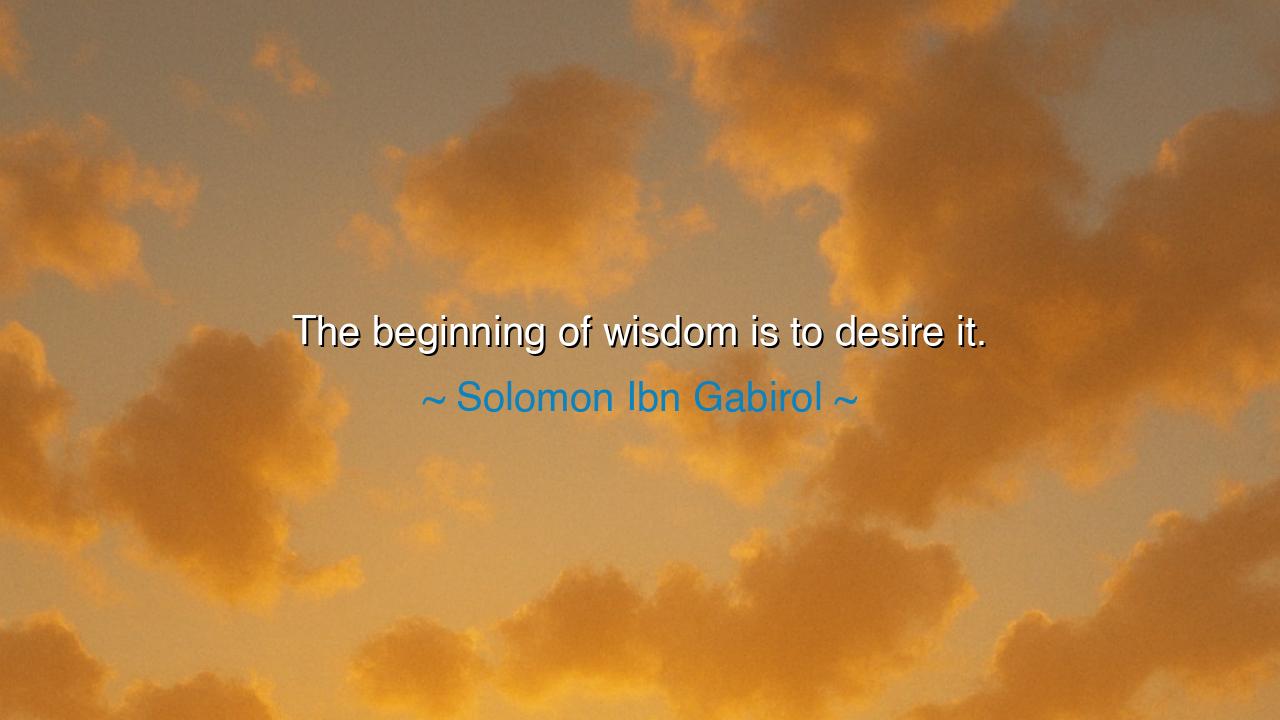
The beginning of wisdom is to desire it.






Solomon Ibn Gabirol, poet-philosopher of medieval Spain, declares with the clarity of a prophet: “The beginning of wisdom is to desire it.” In these words he unmasks the first and most necessary step on the path of truth. No man may stumble into wisdom by accident, nor is it poured upon the unwilling. It begins with a flame of yearning in the heart, a hunger of the soul, a thirst that drives one to seek, to question, to listen. Desire is the seed; without it, no harvest of wisdom is possible.
The ancients also bore witness to this. The book of Proverbs cries out, “Wisdom is the principal thing; therefore get wisdom: and with all thy getting, get understanding.” But how can one obtain if he does not first desire? Ibn Gabirol, rooted in both Jewish thought and the philosophy of the Greeks, saw that longing itself is sacred—that the yearning to know truth is already the first step toward it. For he who does not desire wisdom remains forever a prisoner of folly, though surrounded by teachers and books.
History shines with this truth. Siddhartha Gautama, the Buddha, was born amidst luxury, yet he was unsatisfied. His desire to understand suffering led him from palace to forest, from illusion to enlightenment. Had he not desired wisdom, he would have remained a prince, comfortable yet blind. Instead, desire ignited the journey that changed the world.
So too in the story of Socrates, who confessed that he knew nothing, yet burned with the desire to know. This desire became his greatness. He sought wisdom not as possession, but as lifelong pursuit. Even at his death, he remained the humble seeker, showing that the path of wisdom is endless, but it begins with a single longing.
Let the generations remember: greatness of soul is not first in knowledge but in desire. To hunger for truth is nobler than to be stuffed with empty words. For desire opens the door, awakens the mind, and sets the heart on pilgrimage. Ibn Gabirol speaks to us across the centuries: kindle the flame of longing within, for in that fire lies the first step to eternity. The beginning of wisdom is to desire it—and from that desire flows every light that can guide a human life.






OFOMG FUCK
There’s something profoundly humbling about this line. It suggests that wisdom isn’t about intelligence or education but about humility — the awareness of not knowing. Yet, I question how this desire manifests. Is it a quiet openness to truth, or a restless pursuit of answers? Can one desire wisdom too much and become obsessed with appearing wise rather than being wise? It’s an interesting paradox worth exploring.
TLTrang Linh
I really resonate with the idea that wisdom begins with desire. It reminds me of how motivation shapes learning — without genuine curiosity, knowledge feels hollow. But I also wonder: can desire alone lead to wisdom, or is it possible to want it deeply and still miss it due to ego or bias? What does it take to transform that initial longing into real insight and discernment?
TVTan Vu
This quote feels both inspiring and slightly unsettling. If the first step toward wisdom is wanting it, what happens to those who don’t even know to seek it? Does ignorance become a self-perpetuating trap? I’m curious about how this idea might apply to education or personal growth — do we need to teach people to value wisdom before they can begin to acquire it?
GFGear Fixed
I find this quote intriguing because it suggests that wisdom isn’t something we stumble upon but something we must yearn for. It makes me wonder — can someone truly be wise if they never consciously seek understanding or self-awareness? Or does wisdom sometimes emerge unintentionally through life experiences and hardships, even without an explicit desire for it? I’d love to hear thoughts on whether intent is essential for true wisdom.